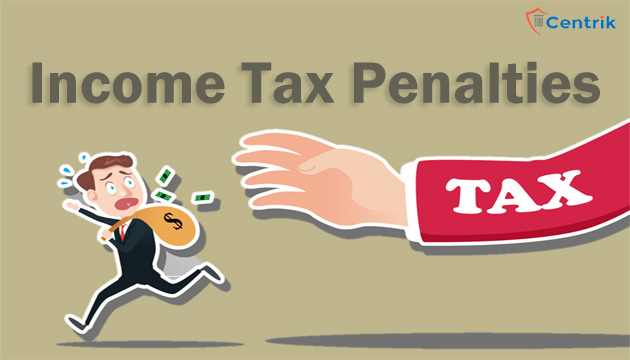
Income tax act 1961 provides for heavy fees and penalties in case of tax evasion. There can be many reasons which may lead to non-compliance of Income tax act and rules. Here in this article we are going to discuss what should we take care of with regard to ITR filing and other provisions of Income tax.
Following can be the cases where one can avoid hefty penalties after taking care of certain provisions of Income tax act.
1) Not Filing of Income Tax Return
Non submission of Income tax return which is required to be file under the Section 139(1) may lead to penalties.
A new section 234F has been inserted to ensure timely filing of returns of income. As per section 234F, if a person is required to file income tax return (ITR) but does not file it on time prescribed under Income tax act then late fees have to be deposited by him while filing his ITR.
2) Not checking Form 26AS before ITR Filing
Income details to be furnish in ITR form shall be matched with 26AS. Any mismatch in both may lead to severe punishment.
3) Not providing PAN or quoting wrong PAN
In case of non- quoting of PAN no. to your employer at the time of employment, 20% TDS will be deducted from your salary instead of 10%. Further penalty of 10,000 may be slapped in case of quoted PAN is incorrect.
4) Not paying Tax as per self-assessment
As per Section 140 A (1) of Income Tax Act, if the tax payer fails to pay either wholly or partly self-assessment tax or interest then the tax payer will be treated as a defaulter.
And as per Section 221(1), a defaulter may be charged with penalty by the assessing officer.
5) Concealing Income to evade tax
The penalty for not proving correct details of your income or concealing income tax will be 100% to 300% of the tax evaded as per section 271(C) of Income Tax Act. Under section 271 AAB, the penalty may vary under different scenarios:
a) If the tax payer admits the undisclosed income then only 10% of the previous year’s undisclosed amount along with interest will be levied.
b) If the tax payer does not disclose the undisclosed amount but does so in the return of income furnished in the previous year, a penalty of 20% of the undisclosed amount along with interest will be levied.
c) If the amount is undisclosed for the previous year then minimum 30% and maximum 90% penalty can be levied.
6) Not Complying with income tax notice
In case a tax payer fails to comply with the notice issued by income tax department under Section 142(1) or 143(2) then the assessing officer can issue a notice, either asking to file the return of income or to furnish in writing all the details of assets and liabilities.
Conclusion: In perspective of enhancing tax compliance, it is imperative that the Income tax act shall be strictly complied. And we need to have extra cautious about our return filings. Non complying with the Income tax provisions strictly may lead to hefty penalties on you. We all shall be aware of this and shall not make any mistake while filing Income tax return.




 join For Updates
join For Updates